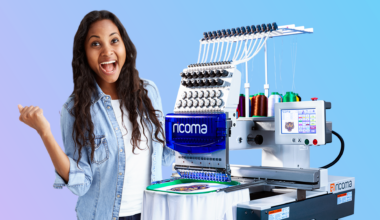On the newest episode of the Embroidery Insider podcast, Henry Ma breaks down five actionable tips that you can apply to your embroidery business to save you time and increase your output.
Read on to discover five implementable strategies that will reduce your downtime and increase your productivity by keeping your machine running.
You may also follow along with the audio version below.
#1: Spool and needle placement matters!
Spool and needle placement are often times overlooked.
If you frequently embroider a certain color, it would be best to have more than one spool of that color already threaded on your machine. This increases efficiency because you’ll be able to switch to a different needle number and you won’t waste time rethreading a new spool.
You also want to avoid placing similar colored spools next to each other, or you can run the risk of choosing the wrong color when selecting the colors of your design.
On larger runs, you might want to match the order of the spools to the color stops, as the machine will take less time to move between the first and second needles than it will between the first and ninth needles.
It’s also important to note that although the number of needles on a multi-needle machine can help you embroider designs that are multicolored, your machine can also help you increase your efficiency.
You can preset certain needles to be ready-to-go for different fabrics by setting the correct tensions, threads and needles for each type. For example, you can have 80/12 needles set up for caps on the first three needles, while having specialty threads and needles set up on the following three needles for small lettering.
#2: Have backup supplies ready and stay organized
As you know, supplies get used up quickly during a production run.
In this case, you would definitely want to keep extra bobbin on the spool pins of your machine or even have extra bobbin cases threaded.
To avoid wasting time searching for materials, you can also use magnets with hooks to store scissors or anything else you may need, since the machine is made out of metal.
Additionally, if there is more than one person on your team, you can make sure each production staff member has a set of supplies handy. Over time, the cost of additional materials is significantly lower than that of all the time spent waiting for someone else to finish a task — or from searching for misplaced materials.
#3: Multitask when possible
The end goal in the machine embroidery industry is to eliminate machine downtime at all costs.
Once your machine is setup properly and you select start, there shouldn’t be much hindering you from running your machine through a full run, besides a bobbin change. Therefore, you may want to use your time wisely by setting up another hoop to prepare for the next run.
Another way to fully maximize efficiency in your embroidery is by investing in a multihead machine. By doing this, you will be able to tackle larger bulk orders, while still being able to meet the demands of smaller, one-off projects.
Pro tip: Production costs actually decrease with multi-heads because the price per head decreases with the more heads the machine has.
Click here to find out why you should start your embroidery business with more than a single-head.
#4: Have the right tools
Having the right tools for your embroidery business makes all the difference. When determining what tools to invest in, you want to consider the type of order you’ll be embroidering.
For example, if it’s a large order of left-chest logos, you can save time by purchasing precut sheets of stabilizer instead of cutting them from a roll.
The right tools can also mean knowing when it’s time to expand. You can get a lot more work done in a fraction of the time with multihead embroidery machines. They may cost more in terms of upfront investment, but you’ll dramatically cut labor costs to offset the financial stress of a larger machine purchase.
You would still want to keep your single head machine for smaller orders, while keeping larger orders running on your multi-head. If you have multiple machines and embroider caps, leave the cap driver installed on one machine and the flat brackets installed on another. If you run more flats than caps, leave the flat brackets on the larger machine and vice versa.
Click here if you’re ready to amplify your business by adding a multi-head to your work station.
#5: KNOWLEDGE IS KEY! Get to know the craft better
The biggest efficiency killer is not knowing your craft inside-out. It really pays to put in the time to learn your machine and craft. This allows you to discover how certain adjustments affect different materials and will save you time and money during production.
For example, if you experience continuous thread breaks because you’re unaware of how tension settings affect embroidery, you’ll wind up frustrated and spending more time than needed on the process.
Record the best practices that have worked for you each time you embroider an item. Include information such as the fabric, thread, needle, backing and tension setting used. Keeping a list handy will save you time in subsequent testing and research.
Luckily, we already have done it for you. Be sure to download this list of 50 fabrics and the best practices to use on each to keep handy with you.
Bottom Line
Whether you’re new to the industry or have years under your belt, these five tips will help you at any stage of your embroidery journey.
Remember, the destination is the journey, so spend as much time trying to learn more about the craft while maintaining your efficiency throughout the production cycle.
For additional help, feel free to join our free Facebook group, Embroidery and Custom Apparel Mastery.
In it, over 10,000 members share their thoughts about embroidery, give insight on various embroidery related issues and provide connections to wholesale items and even jobs!






